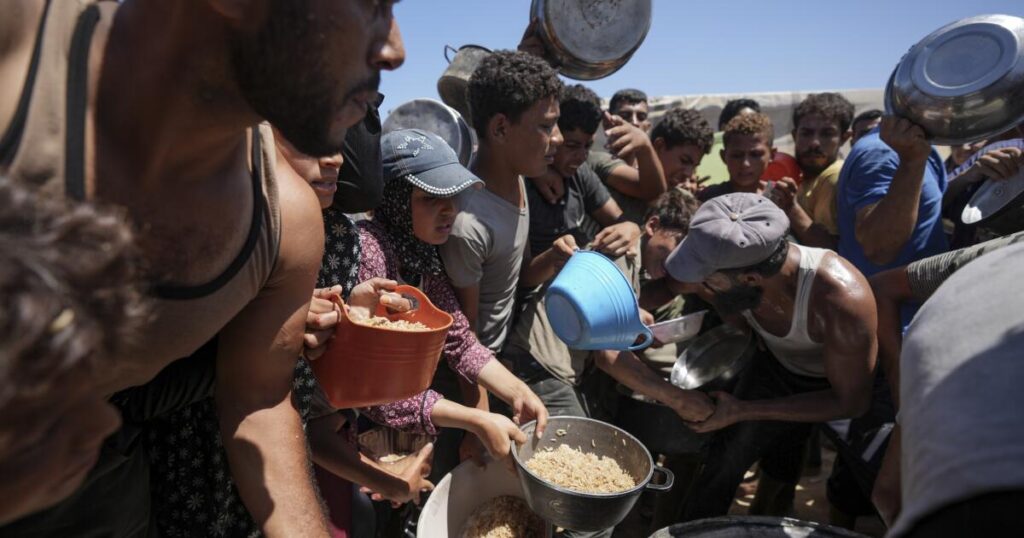Cairo —
Multiple Israeli airstrikes have killed at least 30 Palestinians in the southern Gaza Strip, health officials said on Saturday, while officials including a Hamas delegation were meeting in neighboring Egypt for high-level ceasefire talks.
Nasser Hospital said 11 family members, including two children, were among those killed in an airstrike that hit their home in Khan Younis. The hospital received a total of 33 bodies after three airstrikes in and around the city, including attacks on tuk-tuks and passers-by. Al-Aqsa Martyrs Hospital said it had received three bodies in a separate airstrike.
The Israeli army said it was investigating the reports.
Rescue workers also recovered 16 bodies from the Hamad City area of Khan Yunis after Israeli forces partially withdrew; 10 from a residential neighborhood west of Khan Yunis and two more in Rafah, further south. The cause of death was not immediately clear, but the area had been repeatedly bombed by Israeli forces over the past week. An Associated Press reporter counted the bodies.
Some residents returned to Hamad City, walking among destroyed apartments.
“We have no apartments, no furniture, no homes, nothing. It’s just destroyed,” said a woman named Neveen Kedar. “We are dying slowly. Look, if they would just give us a mercy bullet, it would be better than what is happening to us now.”
The war in Gaza began when Hamas and other militant groups launched a surprise attack on Israel on October 7, killing about 1,200 people, mostly civilians. More than 100 hostages were released during a ceasefire last year, but Hamas is thought to still be holding around 110. Israeli officials estimate about a third have died.
More than 40,000 Palestinians have been killed in Israeli retaliation, according to the Gaza Health Ministry, which does not distinguish between civilians and combatants in its count. A total of 69 people were killed across the Gaza Strip in the past 24 hours, and 212 were taken to hospital with injuries, the ministry said on Saturday.
The conflict has caused widespread destruction, forcing most of Gaza’s 2.3 million residents from their homes and confined to a shrinking “humanitarian zone.”
Experts met Saturday to discuss technical issues ahead of high-level talks in Cairo on Sunday about a possible ceasefire brokered by the United States, Egypt and Qatar. CIA Director William Burns, Qatar’s foreign minister and Egypt’s intelligence chief met in Cairo on Saturday evening, according to an Egyptian official with direct knowledge of the talks.
A Hamas delegation arrived in Cairo on Saturday and met with Egyptian and Qatari officials, senior Hamas official Mahmoud Merdawi told The Associated Press. He said Hamas would not take a direct part in Sunday’s talks but would receive briefings from Egypt and Qatar.
The Israeli delegation that arrived on Thursday included the heads of the foreign intelligence agency Mossad and the security service Shin Bet, as well as its top commander, Maj. Gen. Eliezer Toledano.
CIA director and Biden’s senior Middle East adviser, Brett McGurk, is leading the U.S. side of the negotiations amid deep differences between Israel and Hamas over Israel’s insistence on maintaining troops in two strategic corridors in the Gaza Strip.
The United States is pushing the proposal aimed at bridging the gap between Israel and Hamas amid growing concerns about a wider regional war following recent targeted killings of leaders of the militant groups Hamas and Hezbollah blamed on Israel.
Chairman of the US Joint Chiefs of Staff, General CQ Brown Jr., will visit Egypt, Jordan and Israel over the next few days to “emphasize the importance of deterring further escalation of hostilities,” according to the statement.
Biden spoke by phone with Israeli Prime Minister Benjamin Netanyahu on Wednesday to stress the urgency of reaching a deal, and on Friday he discussed progress with the leaders of Qatar and Egypt.
The major sticking points are the Philadelphia Corridor along the Gaza-Egypt border and the Netzarim Corridor that runs east to west through the Gaza Strip, which Netanyahu has insisted Israel retain control of to prevent smuggling and capture militants.
Merdawi said Hamas’ position had not changed from its acceptance of an earlier draft that included a complete withdrawal of Israeli troops from Gaza.
Associated Press writer Magdy reported from Cairo and Emirates from Bangkok. Associated Press writer Wafa Shurfa contributed to this report from Deir al-Balah in the Gaza Strip.



